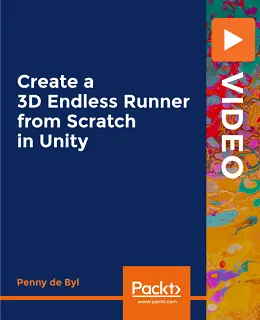Create a 3D Endless Runner from Scratch in Unity [Video]

Create a 3D Endless Runner from Scratch in Unity [Video]
English | MP4 | AVC 1920×1080 | AAC 44KHz 2ch | 9h 30m | 2.95 GB
eLearning | Skill level: All Levels
Create a 3D Endless Runner from Scratch in Unity [Video]: Build an infinite scrolling game in Unity with C#, working through all stages of game development
Who doesn’t love a good endless runner game? It’s the genre that reigns from the early platform games of Donkey Kong and Mario Brothers. From Canabalt to Temple Run to Subway Surfer, this casual game has been the pastime of many a gamer with a mobile device and a few moments to while away. Of course, the scenery can look repetitive, but there’s quite a bit of work that goes into creating such a game. The interface has to be constructed with pieces of the environment that can always fit together and be procedurally placed.
- Use the Unity Mecanim system to create and trigger animation states on a character
- Design a GUI with a main menu, pop-up windows, and programmable buttons and sliders
- Program an infinite scrolling 3D platform world
- Implement background music and sound effects
- Create and spawn particle systems for magic spells, explosions, and special effects
- Program a lives count and scoring system that saves the state
- Build an entire casual game from scratch
You’ll start by setting up a character and applying animations in the Unity Mecanim system before writing code to control them. The course gradually takes you through the development of an infinite scrolling 3D world, including the use of the pooling and singleton design patterns. You’ll add obstacles such as fire and walls, which the character is programmed to jump over and destroy. You’ll then put together a graphical user interface (GUI) in Unity’s Canvas system, and learn about alignment, fonts, and screen resolutions. The course will also guide you in programming button presses and sliders and creating pop-up windows. As you advance, you’ll explore particle systems for adding special effects for magic spells and explosions. Finally, you’ll learn how to add background music and sound effects and understand how to control them from the GUI.